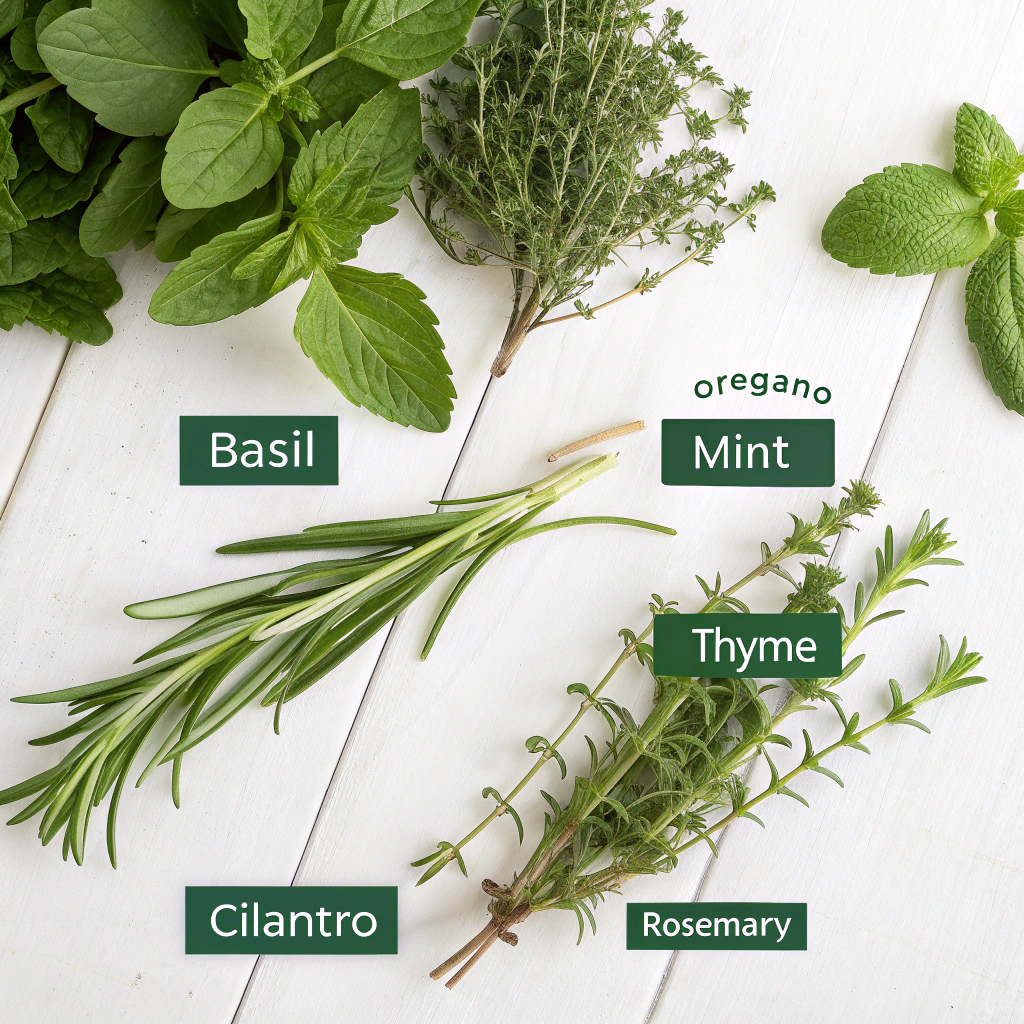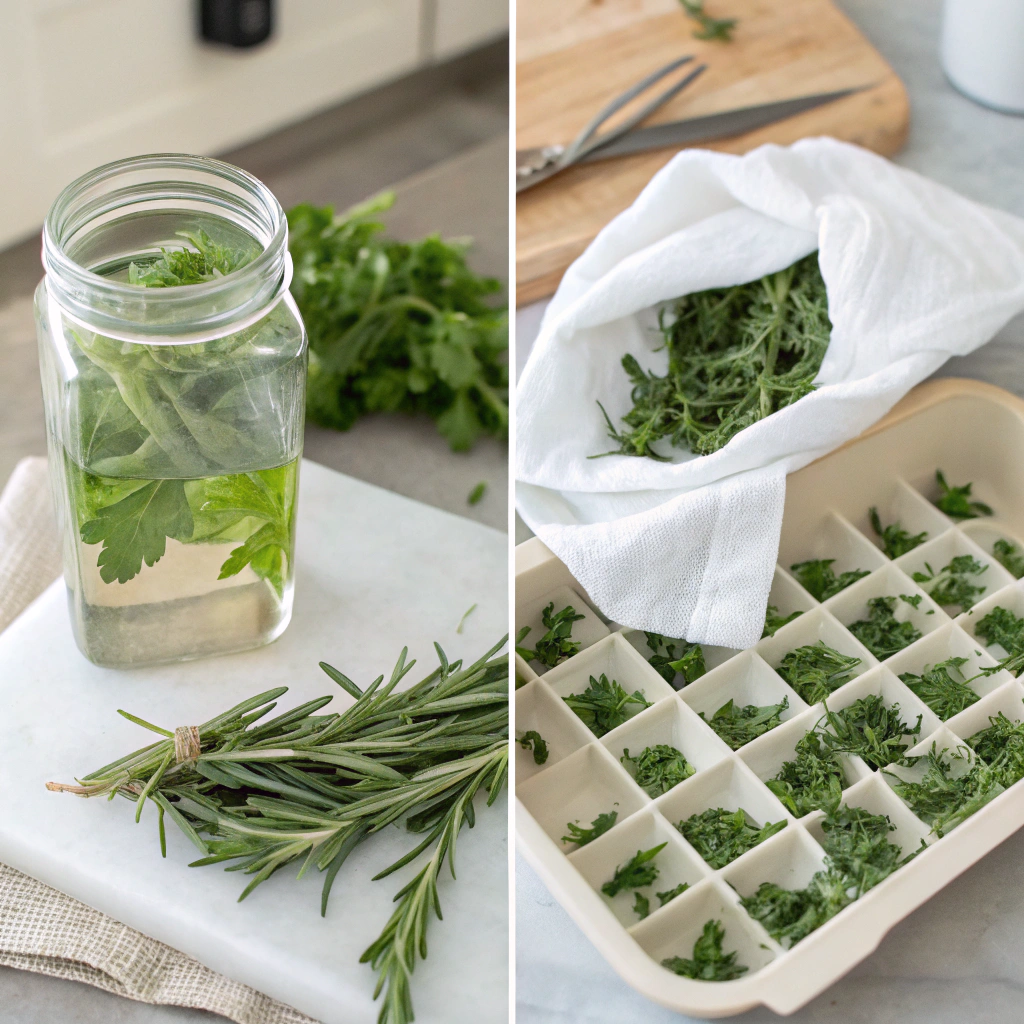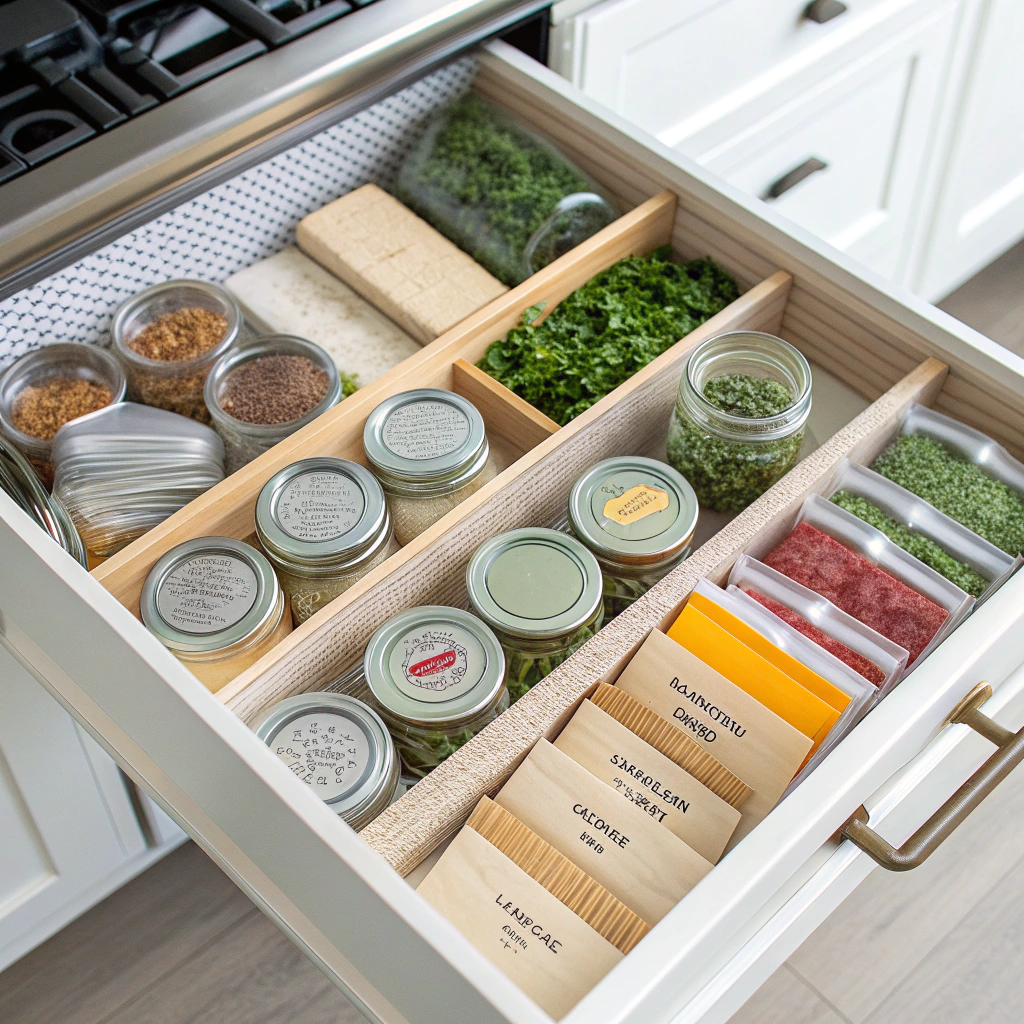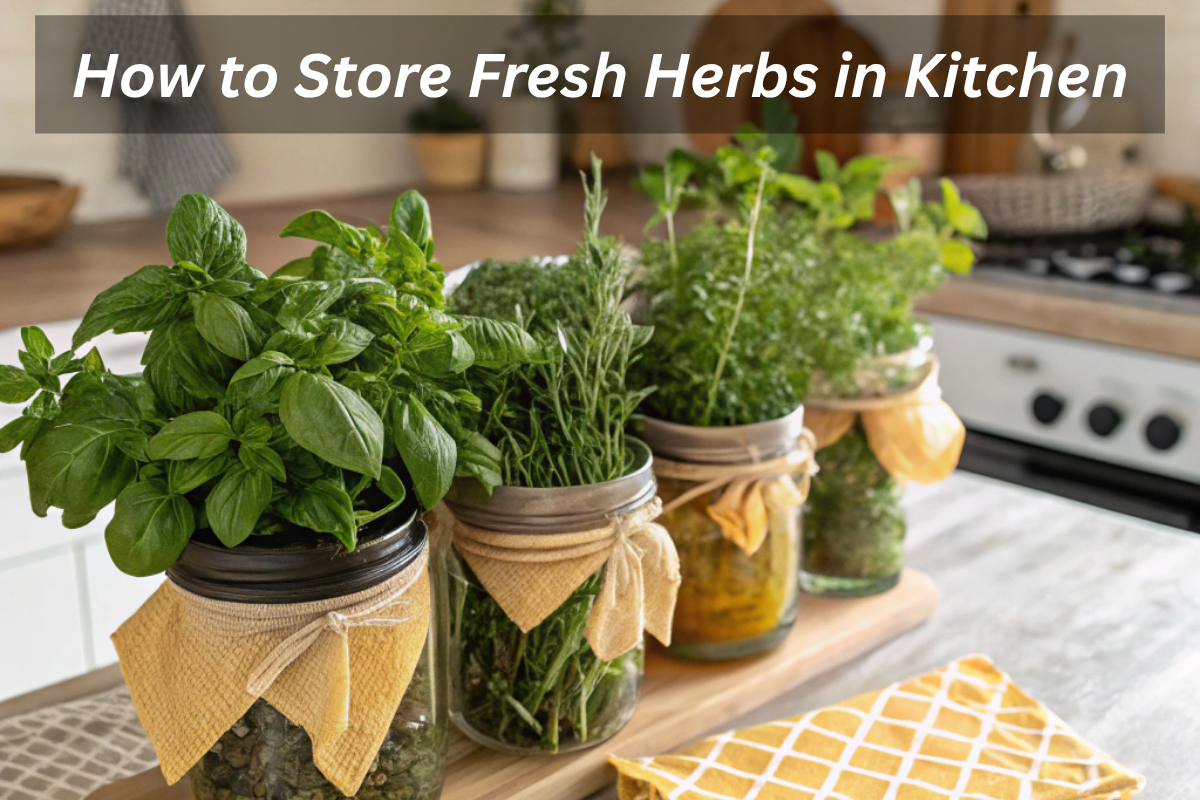Fresh herbs are like secret weapons in the kitchen. They take an ordinary dish and make it pop with flavor, aroma, and color. Whether you’re sprinkling basil on a Margherita pizza or adding cilantro to a curry, herbs are essential. But here’s the catch fresh herbs are fragile and can wilt or spoil within days if you don’t store them properly.
So, how do you make them last longer without sacrificing their taste or texture? That’s exactly what this guide is about. You’ll learn everything you need to know about how to store fresh herbs in kitchen, including clever hacks, storage do’s and don’ts, and even how to revive herbs that seem past their prime.
Let’s dive in and turn your kitchen into a haven of green, flavorful freshness.
Why Proper Herb Storage Matters
Properly storing herbs isn’t just about prolonging their life. It’s about preserving their flavor, avoiding waste, and saving you money in the long run. Let’s break down exactly why it matters.
Nutritional Value Retention
Fresh herbs are loaded with antioxidants, vitamins, and essential oils. But when herbs wilt or dry out, those health benefits vanish. Basil, parsley, mint, and cilantro contain:
- Vitamin C
- Vitamin K
- Iron
- Potent antioxidants
These nutrients degrade quickly when exposed to heat, moisture, or air. Storing them properly helps maintain their full nutritional potential.
Preventing Waste and Spoilage
According to food waste studies, herbs are among the top five most frequently discarded food items in household kitchens. Why?
Because many people:
- Leave them in store packaging
- Don’t rinse and dry them
- Store them near heat sources
All of which lead to faster spoilage.
Let’s look at how to avoid that by understanding the types of herbs first.
Understanding the Types of Fresh Herbs
Before we jump into the actual storage methods, it’s crucial to understand what kind of herb you’re dealing with. Different herbs have different needs, so storage isn’t one-size-fits-all.
Here’s a helpful comparison table:

Fresh Herb Categories: Tender vs. Hardy
| Type of Herb | Examples | Characteristics | Best Storage Method |
|---|---|---|---|
| Tender Herbs | Basil, Cilantro, Parsley, Mint, Tarragon | Delicate leaves, high moisture | Jar with water or damp paper towel |
| Hardy Herbs | Rosemary, Thyme, Oregano, Sage, Chives | Woody stems, lower moisture | Dry wrap in paper towel + container |
| Potted Herbs | Any herb in a soil-filled pot | Live plants needing watering | Leave in sunlight, trim as needed |
Tender Herbs vs. Hardy Herbs
- Tender Herbs love moisture but are easily damaged by excess water.
- Hardy Herbs last longer and don’t need much water.
Understanding this distinction will help you store each herb in the best way possible.
Best Storage Methods for Fresh Herbs
Now that we’ve categorized the herbs, let’s look at the top methods for keeping them fresh in your kitchen. Each method is tailored to a different type of herb or storage goal.
Here’s a quick overview table to help you visualize:

Top Fresh Herb Storage Techniques
| Method | Best For | Supplies Needed | Expected Shelf Life |
|---|---|---|---|
| Water Jar Method | Parsley, Cilantro, Basil, Mint | Glass jar, water, plastic bag | 5–10 days |
| Damp Paper Towel + Zip Bag | Tarragon, Dill, Chervil | Paper towel, zip-lock bag, fridge | 7–10 days |
| Airtight Container + Dry Paper | Rosemary, Thyme, Sage, Oregano | Container, dry paper towel | Up to 2 weeks |
| Freezing Herbs | Any herb (post-wash and dry) | Freezer bags, trays | Up to 6 months |
| Herb Ice Cubes in Olive Oil | Basil, Parsley, Thyme, Rosemary | Ice cube tray, olive oil, freezer | Up to 3 months |
Let’s take a closer look at a few of these popular methods.
Method 1: Water Jar Method (Like Flowers)
One of the easiest and most effective ways to store tender herbs.
How It Works:
- Trim the stems of your herbs.
- Place them upright in a glass of water (like flowers).
- Cover loosely with a plastic bag.
- Store in the fridge except for basil (which prefers room temp).
Pros: Keeps herbs crisp and hydrated
Cons: Water needs to be changed every 2–3 days
Method 2: Damp Paper Towel + Zip Bag
Perfect for delicate, leafy herbs.
How It Works:
- Gently rinse and pat herbs dry.
- Wrap loosely in a damp paper towel.
- Place inside a zip-top bag and store in the fridge.
Pros: Prevents moisture loss
Cons: Too much moisture = rot
Method 3: Airtight Container with Dry Paper
This technique is ideal for hardy herbs like rosemary, thyme, oregano, and sage.
How It Works:
- Rinse herbs gently and let them air dry completely.
- Line an airtight container with a dry paper towel.
- Place the herbs inside, making sure they aren’t overcrowded.
- Store in the crisper drawer of your fridge.
Pros: Keeps hardy herbs dry and clean
Cons: Doesn’t work well for tender herbs
Tip: Change the paper towel every few days to avoid moisture buildup.
Method 4: Freezing Fresh Herbs
Freezing is an excellent way to preserve herbs long-term, especially if you have a large batch.
Freezing Methods Compared
| Freezing Option | Best For | Steps | Shelf Life |
|---|---|---|---|
| Plain Freezing | Parsley, Dill, Cilantro | Wash, chop, freeze in zip bags | Up to 6 months |
| Blanched Freezing | Basil, Spinach (preserves color) | Dip in boiling water 5 sec, ice bath, dry, freeze | 6–8 months |
| Tray-Freezing | Chopped herbs in small portions | Spread on tray, freeze, then transfer to container | 6 months |
| Vacuum Sealed Freezing | All types | Freeze with vacuum sealer for longer life | Up to 1 year |
Pros: Preserves flavor without cooking
Cons: Herbs lose texture; best used in cooked dishes
Pro Tip: Don’t freeze herbs with high water content (like lettuce-style herbs) unless chopped first.
Method 5: Herb Ice Cubes in Olive Oil
This is a chef-level kitchen hack that’s perfect for herbs you use in sautéing or soups.
How It Works:
- Chop your herbs.
- Place them in an ice cube tray.
- Cover with olive oil (or melted butter).
- Freeze and transfer to a freezer-safe bag.
Pros: Quick seasoning for cooking
Cons: Not suitable for garnish or raw dishes
Great for: Rosemary, Thyme, Oregano, Basil, Sage
Storage Do’s and Don’ts for Fresh Herbs
When it comes to keeping your herbs green and fresh, habits matter. A lot of people lose herbs quickly simply because they store them wrong. Here’s a table to help you stay on the right path.
Herb Storage Do’s and Don’ts Table
| Do’s | Don’ts |
|---|---|
| ✔ Trim stems before storing | ❌ Don’t store near heat (stove, sunlight) |
| ✔ Wash herbs gently and pat dry | ❌ Don’t use sealed bags when herbs are wet |
| ✔ Label and date herb storage bags | ❌ Don’t store basil in the fridge |
| ✔ Use breathable or airtight containers | ❌ Don’t overcrowd herbs in containers |
| ✔ Change water or paper towels regularly | ❌ Don’t keep herbs in original store bag |
Let’s break a few of these down:
Do: Rinse and Dry Properly
Always rinse herbs right after buying them—but dry them thoroughly before storage. Excess moisture causes mold and rot.
Don’t: Store All Herbs the Same Way
Basil likes room temperature. Cilantro prefers cold water in a jar. Oregano does best wrapped dry in paper towel. One method doesn’t fit all.
Do: Trim Stems for Longevity
Just like flowers, herbs with stems last longer if you trim the ends before placing them in water or wrapping them up.
Don’t: Keep Herbs Near Stove or Window
Sunlight and heat speed up wilting and yellowing. Always store herbs in a cool, dark, and humid-controlled space like the fridge drawer.
Tools and Containers You’ll Need
If you’re serious about keeping herbs fresh, you’ll want to invest in a few essential tools. Thankfully, most are affordable and reusable.
Recommended Herb Storage Supplies
| Tool/Container | Purpose | Best For |
|---|---|---|
| Glass Mason Jars | Water jar method | Basil, Parsley, Cilantro |
| Zip-Top Bags | Storing wrapped herbs | Mint, Tarragon, Chervil |
| Airtight Containers | Keeping herbs dry and protected | Thyme, Rosemary, Sage |
| Herb Keeper | Specialized container with water reservoir | Mixed herbs |
| Paper Towels | Moisture control | All types |
| Labels and Markers | Organization and tracking | Date, type, shelf life |
| Ice Cube Trays | Making herb oil cubes | Frozen storage of chopped herbs |

You can find most of these items at your local kitchen store or online for under $10 each.
How Long Do Fresh Herbs Last When Stored Properly?
Even with perfect storage, fresh herbs don’t last forever. Their shelf life depends on the method used, the type of herb, and how fresh they were when you bought them.
Here’s a detailed herb longevity chart based on storage methods:
Herb Longevity Chart by Storage Method
| Herb | Storage Method | Fridge Life | Freezer Life |
|---|---|---|---|
| Basil | Water jar at room temp, loosely covered | 4–5 days | 3–6 months (oil cubes) |
| Parsley | Water jar in fridge | 7–10 days | 4–6 months |
| Cilantro | Water jar in fridge | 7–10 days | 4 months |
| Thyme | Dry wrap in container | 10–14 days | 6–12 months |
| Rosemary | Dry wrap in container | 14 days | 6–8 months |
| Mint | Damp paper towel + zip bag | 5–7 days | 3–4 months |
| Chives | Airtight container | 5–6 days | 1–2 months |
| Oregano | Dry wrap or freeze | 10–14 days | 6+ months |
| Dill | Paper towel wrap in zip bag | 4–6 days | 2–3 months |
| Sage | Container with dry towel | 10–14 days | 3–4 months |
Pro Tip: Herbs tend to last longer in the freezer, but you’ll sacrifice texture so use frozen herbs only in cooked dishes.
Mistakes to Avoid When Storing Fresh Herbs
Even with the right tools and intentions, people often unknowingly shorten the life of their herbs. Avoiding these pitfalls can instantly boost how long your herbs stay vibrant.
1. Leaving Herbs in Store Packaging
Most herbs come in plastic clamshells or shrink-wrapped bundles. These are designed for short-term transport, not long-term storage.
| Packaging Type | Problem | Better Alternative |
|---|---|---|
| Plastic clamshells | Traps moisture, speeds up wilting | Rewrap in paper towel + zip bag |
| Rubber band bundles | Crushes delicate stems | Trim and repackage immediately |
| Plastic wrap | No airflow; herbs suffocate | Transfer to breathable storage method |
Tip: Always remove herbs from grocery store packaging within 1–2 hours of getting home.
2. Washing Herbs and Storing While Wet
Yes, herbs should be rinsed. But storing them while dripping wet? That’s a recipe for mold.
What to do instead:
- Rinse gently under cold water
- Use a salad spinner or pat dry with a towel
- Let them air dry for 10 -15 minutes before wrapping or storing
3. Storing Basil in the Fridge
Basil turns black in cold temps. It’s one of the few herbs that prefers room temperature.
Best way to store basil:
- Trim stems
- Place in a jar with room-temperature water
- Loosely cover with a plastic bag
- Leave on the counter, away from sunlight
4. Not Using Herbs in Time
People often wait too long to use fresh herbs, expecting them to last forever. The truth is even well-stored herbs degrade.
Solution:
- Plan meals around your herb supply
- Freeze excess before it spoils
- Use fading herbs in soups, stocks, or oils
Best Herbs for Beginner Cooks to Store Easily
If you’re new to cooking with fresh herbs, some varieties are easier to store and maintain than others. Here are five foolproof options for your kitchen.
Top 5 Easiest Fresh Herbs to Store and Use
| Herb | Flavor Profile | Why It’s Easy to Store | Best Uses |
|---|---|---|---|
| Parsley | Fresh, grassy | Thrives in water jars or wrapped in damp towel | Garnishes, sauces, soups |
| Cilantro | Bright, citrusy | Keeps well in water; revives easily with ice bath | Mexican, Indian, Asian dishes |
| Mint | Cool, refreshing | Easy to wrap; stays fragrant in fridge | Teas, desserts, cocktails |
| Thyme | Earthy, pungent | Long shelf life when dry-stored | Roasts, stews, potatoes |
| Chives | Oniony, mild | Keeps 5–7 days in airtight container | Toppings, spreads, egg dishes |
These herbs are forgiving and versatile perfect for getting started with fresh herb storage.
Conclusion
Fresh herbs are tiny flavor bombs but they’re also delicate. If you’ve ever felt frustrated watching your parsley wilt or your mint turn slimy, you’re not alone. The good news? With just a few smart habits, you can extend the life of your herbs by days, even weeks.
Here’s a quick recap:
- Match the method to the herb: Water jar for tender herbs, dry wrap for hardy ones.
- Avoid moisture traps: Rinse and dry thoroughly before storing.
- Label, rotate, and use wisely: Don’t let herbs get lost in your fridge.
- Get creative: Freeze, dehydrate, or infuse herbs into oil for longer life.
Whether you’re a home cook or kitchen pro, storing herbs properly means less waste, more flavor, and serious money saved.
Now, go ahead and fill your kitchen with the aroma of fresh, long-lasting herbs












